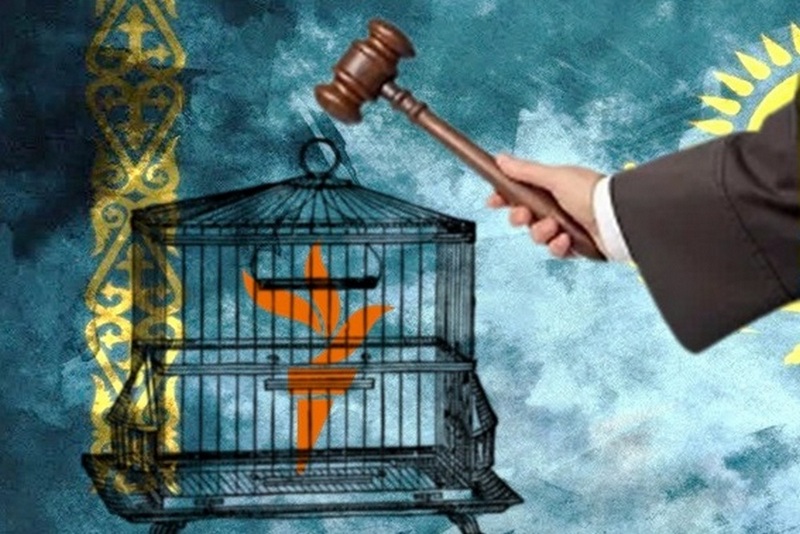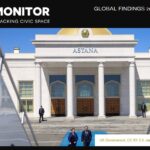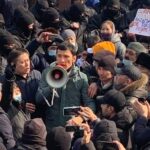In The Specialized Interdistrict Administrative Court of Astana, RFE/RL–Kazakhstan is challenging the Ministry of Foreign Affairs over its decision to deny accreditation to several journalists working for the media outlet.
On July 11, RFE/RL–Kazakhstan, also known as Radio Azattyq, filed an administrative lawsuit against the Ministry of Foreign affairs, represented by theLegal Media Center, after the Ministry refused to renew the accreditation of 16 of the outlets journalists.
In the rejection letter, the Ministry justified the decision by stating it was grounded in Radio Azattyq’s repeated violations of clause 4 of article 30 of the law ‘On Mass Media’. This clause prohibits foreign media outlets and foreign journalists from conducting professional journalistic activity in Kazakhstan without proper accreditation.
However, several of the journalists who were denied accreditation are Kazakhstani citizens, not foreign nationals. Nevertheless, the Ministry argued that the law still applies, as the journalists are employed by a foreign media outlet.
Radio Azattyq rejected this interpretation, calling it legally flawed and unsound:
“It also said that since the affected journalists are Kazakhstan citizens employed by a foreign media outlet, the application of article 30 (4) which refers to foreign journalists was inappropriate and legally unsound.”
The outlet further accused the ministry of purposely delaying the accreditation process:
“The Respondent, by abusing their rights within the administrative procedure over the course of four months, created a situation which was then used as the basis for refusing accreditation, citing Clause 4 of Article 30 of the Law.”
According to Radio Azattyq, the outlet submitted a request for the renewal of the journalists’ accreditation in mid-February, two months before their accreditations were set to expire. According to Kazakhstani law, the ministry is required to response within two months – either grating the accreditation or issuing a legally justified refusal.
Instead of responding – though legal – the Ministry extended the review by an additional two months, resulting in the expiration of the journalists’ accreditation in the meantime.
In mid-June, seven of Radio Azattyq’s journalists were officially denied accreditation. Later, on July 15, the Ministry issued refusals for nine more.
Denial of mutual agreement
On July 17, the Ministry declined to participate in court conciliation procedure. Even though the Ministry has not given any official reason, the unwillingness to participate could be interpreted as a conscious rejection of dialogue and compromise in a case with far-reaching consequences for press freedom in Kazakhstan.
Furthermore, this could reflect a confrontational approach from the state authorities, opting to resolve the matter through litigation rather than through administrative dialogue and in accordance with good governance practices.
This raises several concerns. Conciliation procedures play an important role in ensuring legal certainty, minimisation of conflicts and enable mutual understanding – especially in cases affecting fundamental rights such as freedom of expression and freedom of the press.
By denying to participate in this kind of procedure the authorises send a message that they are not willing to engage in open and constructive dialogue with foreign media.
International Concerns
According to Human Rights Watch (HRW), the Ministry’s refusal to accredit the journalists represents a serious violation of press freedom and places Kazakhstan in breach of its International human rights obligations.
HRW argues that the decision is incompatible with Kazakhstan’s commitments under the International Covenant on Civil and Political Rights (ICCPR), to which the country is a party.
Article 19 of the ICCPR guarantees the right to freedom of expression, including press freedom:
Everyone shall have the right to freedom of expression; this right shall include freedom to seek, receive and impart information and ideas of all kinds, regardless of frontiers, either orally, in writing or in print, in the form of art, or through any other media of his choice.
Under international law, any limitations on this right must be necessary, proportionate, and clearly defined in law. HRW emphasises that a general or arbitrary refusal of accreditation, especially to journalists who are citizens of the country, cannot be justified without a clear, legal, and legitimate reason.
Future ahead
This rejection of accreditation is not an isolated incident, but rather a part of a continuing struggle for Radio Azattyq to continue their work in Kazakhstan. According to HRW, in 2022, the authorities withheld accreditation from the outlet’s reporters.
Again, in 2024, the authorities denied accreditation to 36 journalists from the outlet. However, this decision was reversed following a legal challenge and international pressure.
For now, the outcome of the case remains uncertain, but it is likely to have implications for how accreditation rules will continue to be interpreted and enforced for foreign-affiliated media operating in Kazakhstan.
















